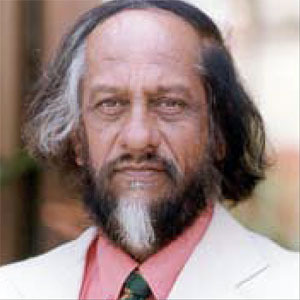Rajendra K. Pachauri2009 Presenters

Rajendra K. Pachauri
Rajendra K. Pachauri, Ph.D., director general, The Energy and Resource Institute (TERI; formerly Tata Energy Research Institute), New Delhi, and chair, Intergovernmental Panel on Climate Change (IPCC), co-recipient of the 2007 Nobel Peace Prize
“We need to redefine human values; therefore, we may need some changes in lifestyle as well. There has been a relentless pursuit of more and more goods and services without regard to the impacts not only on the environment, but also on human desires and human aspirations. The value has been in producing and consuming more and more. In America and all over the world, in faith organizations, everywhere we need to start looking at some of these basic human values.”
As chair of the IPCC and a prominent Indian citizen, R.K. Pachauri is in a unique position to discuss environmental standards in developing nations while also addressing increased energy and clean water access and food security for the poor. Explaining how climate change may further stress water resources, he points to the challenges posed for India, China, and other proximate countries by glacier-melting in the Himalayas, which will cause water scarcity for up to 500 million people and could lead to migrations away from the rivers fed by these glaciers in the next two to three decades. He has advocated more efficient uses of water for agriculture in India but acknowledges that efficiency alone will not solve projected water shortages.
After holding several managerial positions in India in the 1960s, Pachauri enrolled at North Carolina State University in Raleigh, where he earned an M.S. in industrial engineering in 1972 and two Ph.D.s—one in industrial engineering (1974) and one in economics (1976)—and taught in the Department of Economics and Business. Returning to India, he joined the faculty of the Administrative Staff College of India, Hyderabad, before being named director of TERI, a New Delhi-based organization devoted to researching and promoting sustainable development, in April 1991. He played a major role in laying the groundwork for the 1997 Kyoto Protocol. In 2002 he was elected to lead the IPCC, an international body that assesses the current status and causes of climate change and projects future environmental and socioeconomic impacts.
Read a more detailed Nobel Conference profile of Dr. Pachauri written by freelance science writer A.J.S. Rayl.
TOPIC: Dr. Pachauri will discuss the impact climate change will have on world water resources, the water crises already faced by the 1 billion people currently without access to fresh water and the 2.4 billion without basic sanitation facilities, the impending threat to peace and security, and the foundations for solution set forth by the IPCC.